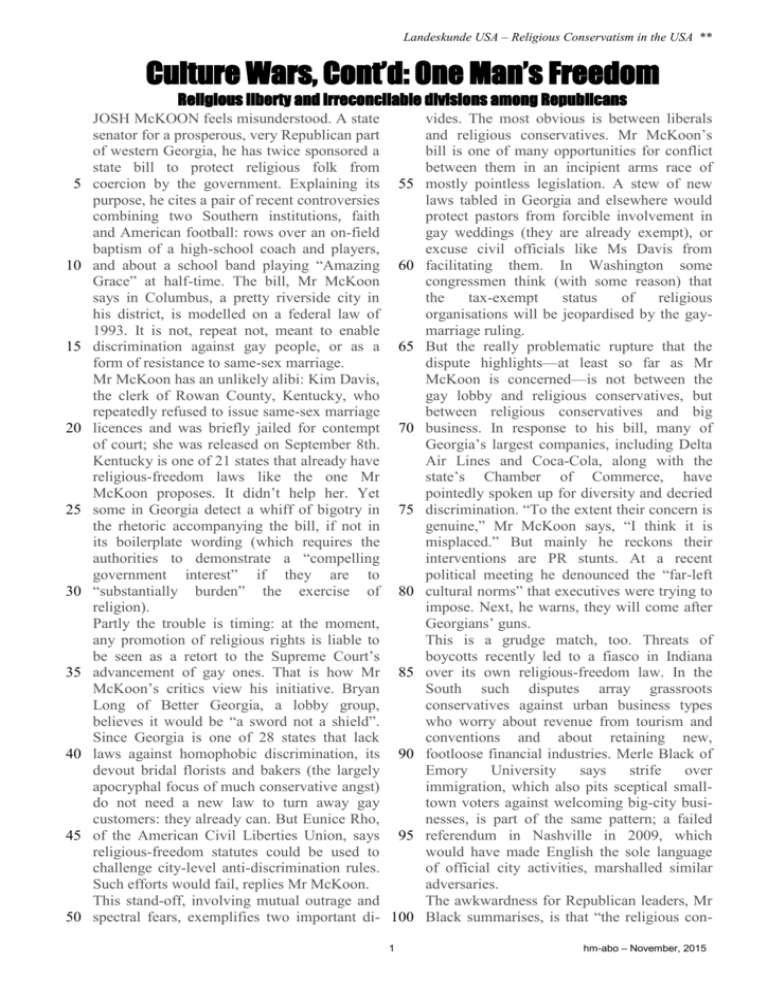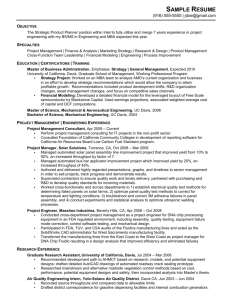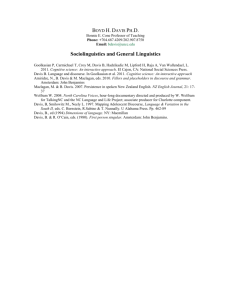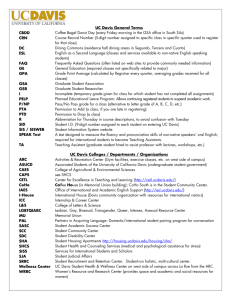
Landeskunde USA – Religious Conservatism in the USA **
Culture Wars, Cont’d: One Man’s Freedom
Religious liberty and irreconcilable divisions among Republicans
5
10
15
20
25
30
35
40
45
50
JOSH McKOON feels misunderstood. A state
senator for a prosperous, very Republican part
of western Georgia, he has twice sponsored a
state bill to protect religious folk from
coercion by the government. Explaining its 55
purpose, he cites a pair of recent controversies
combining two Southern institutions, faith
and American football: rows over an on-field
baptism of a high-school coach and players,
and about a school band playing “Amazing 60
Grace” at half-time. The bill, Mr McKoon
says in Columbus, a pretty riverside city in
his district, is modelled on a federal law of
1993. It is not, repeat not, meant to enable
discrimination against gay people, or as a 65
form of resistance to same-sex marriage.
Mr McKoon has an unlikely alibi: Kim Davis,
the clerk of Rowan County, Kentucky, who
repeatedly refused to issue same-sex marriage
licences and was briefly jailed for contempt 70
of court; she was released on September 8th.
Kentucky is one of 21 states that already have
religious-freedom laws like the one Mr
McKoon proposes. It didn’t help her. Yet
some in Georgia detect a whiff of bigotry in 75
the rhetoric accompanying the bill, if not in
its boilerplate wording (which requires the
authorities to demonstrate a “compelling
government interest” if they are to
“substantially burden” the exercise of 80
religion).
Partly the trouble is timing: at the moment,
any promotion of religious rights is liable to
be seen as a retort to the Supreme Court’s
advancement of gay ones. That is how Mr 85
McKoon’s critics view his initiative. Bryan
Long of Better Georgia, a lobby group,
believes it would be “a sword not a shield”.
Since Georgia is one of 28 states that lack
laws against homophobic discrimination, its 90
devout bridal florists and bakers (the largely
apocryphal focus of much conservative angst)
do not need a new law to turn away gay
customers: they already can. But Eunice Rho,
of the American Civil Liberties Union, says 95
religious-freedom statutes could be used to
challenge city-level anti-discrimination rules.
Such efforts would fail, replies Mr McKoon.
This stand-off, involving mutual outrage and
spectral fears, exemplifies two important di- 100
1
vides. The most obvious is between liberals
and religious conservatives. Mr McKoon’s
bill is one of many opportunities for conflict
between them in an incipient arms race of
mostly pointless legislation. A stew of new
laws tabled in Georgia and elsewhere would
protect pastors from forcible involvement in
gay weddings (they are already exempt), or
excuse civil officials like Ms Davis from
facilitating them. In Washington some
congressmen think (with some reason) that
the
tax-exempt
status
of
religious
organisations will be jeopardised by the gaymarriage ruling.
But the really problematic rupture that the
dispute highlights—at least so far as Mr
McKoon is concerned—is not between the
gay lobby and religious conservatives, but
between religious conservatives and big
business. In response to his bill, many of
Georgia’s largest companies, including Delta
Air Lines and Coca-Cola, along with the
state’s Chamber of Commerce, have
pointedly spoken up for diversity and decried
discrimination. “To the extent their concern is
genuine,” Mr McKoon says, “I think it is
misplaced.” But mainly he reckons their
interventions are PR stunts. At a recent
political meeting he denounced the “far-left
cultural norms” that executives were trying to
impose. Next, he warns, they will come after
Georgians’ guns.
This is a grudge match, too. Threats of
boycotts recently led to a fiasco in Indiana
over its own religious-freedom law. In the
South such disputes array grassroots
conservatives against urban business types
who worry about revenue from tourism and
conventions and about retaining new,
footloose financial industries. Merle Black of
Emory University says
strife
over
immigration, which also pits sceptical smalltown voters against welcoming big-city businesses, is part of the same pattern; a failed
referendum in Nashville in 2009, which
would have made English the sole language
of official city activities, marshalled similar
adversaries.
The awkwardness for Republican leaders, Mr
Black summarises, is that “the religious conhm-abo – November, 2015
Landeskunde USA – Religious Conservatism in the USA **
servatives have the votes, but the business
other Republicans added anti-discrimination
conservatives have the money.” Given the 115 clauses that he claims were needless and
South’s early importance in next year’s
confusing. Religious conservatives, he argues,
Republican presidential primaries, the split in
must achieve some of their aims if the
105 local priorities is liable to colour, and help to
Republican coalition is to hold. With
prolong, the national contest. It was reflected
elections in prospect, he may prevail. In any
this week in the candidates’ responses to the 120 case, an even bigger bust-up between the
drama in Kentucky: Ted Cruz and Mike
corporate and religious lobbies looms—over
Huckabee raced to embrace Ms Davis,
whether to change Georgia’s constitution to
110 Christian activists’ new mascot; others
let in casinos.
remained aloof.
[THE ECONOMIST, Sept 12, 2015; 825 words;
Mr McKoon, meanwhile, hopes his bill will
reprinted by permission; all rights reserved.]
finally pass in 2016; it stalled this year after
Annotations:
5 coercion ......................... the action of making somebody do something that they do not want
to do, using force or threatening to use force.
9f. “Amazing Grace” ........ confusion and fear, usually caused by violent behaviour or by some
sudden shocking event
25 whiff .............................. a smell, especially one that you only smell for a short time; a slight
sign or feeling of something
25 bigotry ........................... the state of feeling, or the act of expressing, strong, unreasonable
beliefs or opinions
26f. boilerplate..................... a standard form of words that can be used as a model for writing
parts of a business document, legal agreement, etc.
34 retort ............................. a quick, angry or humorous reply
43 apocryphal .................... (of a story) well known, but probably not true
50 spectral.......................... literary use: like a ghost; connected with a ghost
85 to array something ....... to arrange a group of things in a pleasing way or so that they are in
order; here: to arrange soldiers in a position from which they are
ready to attack
85 grassroots...................... ordinary people in society or in an organization (e.g. a party), rather
than the leaders or people who make decisions
111 aloof............................... not friendly or interested in other people; distant, remote
2
hm-abo – November, 2015
Landeskunde USA – Religious Conservatism in the USA **
Worksheet “Culture Wars, Cont’d: One Man’s Freedom”
I.
Pre- and Post-Reading Tasks:
Before reading the text:
1. Brainstorming Task: Guess what a text entitled “Culture Wars Cont’d: One Man’s
freedom” could be about. Then compare your assumptions in class.
2. Preliminary Homework: Choose one of the following pictures and interpret it. Look up
words/facts, etc. that you do not understand. In the next lesson, compare the pictures and try
to relate them to your results from task 1.
Picture 1:
Picture 2:
3
hm-abo – November, 2015
Landeskunde USA – Religious Conservatism in the USA **
Picture 3:
Picture 4:
4
hm-abo – November, 2015
Landeskunde USA – Religious Conservatism in the USA **
2. Working with video-clips: Now watch these three videos:
(1) “What is Georgia’s new religious “freedom” bill really all about?”
https://www.youtube.com/watch?v=tAzbpEOnY6I
(2) “Georgia Sen. Josh McKoon Defends ‘Religious Freedom’ Bill”
https://www.youtube.com/watch?v=gvMq1zeYIB0
(3) “Kentucky clerk controversy ignites religious freedom debate”
https://www.youtube.com/watch?v=u7Sj_2VoetI
Sum up their content and apply your findings to your results from tasks 1 and 2.
3. Giving Presentations: In groups, do some research on the Republican presidential hopefuls for
the 2016 presidential elections and present them and their views on major issues like religion,
abortion, LGBT-rights, immigration, etc. to your classmates.
After reading the text:
1. News of the week: Follow the news with respect to the current presidential campaigns in the
U.S. and the role religion plays in them and present one news-item to your classmates in no more
than two minutes, also taking relevant background-information and vocabulary into account.
2. Possible oral test: Look at the word-cloud (“wordle”) below: The bigger the words are presented
the more often they appear in the text “wordle”. Choose five words that you find most
important/helpful for an adequate summary of the text and give a two-minute talk on the topic
“Religious Freedom in the U.S.”, in which you both summarize the gist of the text and explain
your choice of words.
5
hm-abo – November, 2015
Landeskunde USA – Religious Conservatism in the USA **
II. Reading Comprehension – Multiple Matching
Josh McKoon has been a politican since the fourth grade. Now 35 years old, he's entering his fifth
year in the Georgia General Assembly, representing Senate District 29. He chairs the Judiciary
Committee and has pushed controversial ethics reform.
What's next? He's not really saying, just pointing out that political oportunity sometimes depends
on timing. Right now, he says he's content with working in the General Assembly.
He recently sat down with reporter Chuck Williams to cover a lot of issues as the legislature
prepares to convene on Monday.
Biographical Information:
Name: Josh McKoon
Age: 35
Job: Attorney, McKoon Law Group, practicing since 2004; Georgia state senator, first elected in
2010
Education: Brookstone School, 1997; Furman University, bachelor of arts in political science,
communications, 2001; University of Alabama School of Law, JD, 2003
Family: Parents, Jim and Barbara McKoon; mother, Sharon McKoon; brothers Patrick McKoon
and Chase McKoon; and stepsister, Debra Kennedy
Q 1: ______
Josh McKoon: I believe the Republican Party stands for allowing the individual to sort of be the
master of their destiny. Kind of get the government out of your way, leave you alone, and allow
you to achieve your potential. And that's really what I think the country was founded on, this
idea that we are going to give you a platform where you can sink or swim. We're going to give
you a fair shot, we're going to give everybody as much as we can a good start in terms of your
initial education, and from there give you every opportunity to be successful.
Q 2: ______
Josh McKoon: I would say it is the means by which we carry on our tradition of self-government
in this country. I mean, that's everything from the campaigning for office, electing someone to
office, but interacting with that person as an elected official. As an elected official, it's dealing
with other constituencies. You have the people who you represent in your district, but you also
have, in my situation, the other 55 members of the Senate, the lieutenant governor, the House of
Representatives, their leadership, and the governor. So, there are a lot of different groups that
you've got to balance a lot of different interests in trying to figure out how to get to where you
want to go.
Q 3: ______
Josh McKoon: That is the tension point. People feel like this is in some way aimed at the gay and
lesbian community, and nothing could be further from the truth. The original federal legislation
was passed in 1993. This is not an issue that just developed in the last year or two. When you
look at the city of Kennesaw saying to a group of Muslims, "We're going to deny zoning to a
mosque," and when they pressed on it, they said, "We just don't allow houses of worship in these
strip mall shopping centers." And then you find out that six months earlier they allowed a
Pentecostal church in there. These are the kinds of things that this bill is designed to address so
someone doesn't literally have to go to federal court to try and get some kind of relief. It's to
make sure that those kind of things don't happen in our state.
6
hm-abo – November, 2015
Landeskunde USA – Religious Conservatism in the USA **
Q 4: ______
Josh McKoon: We're meeting with everybody that is interested in having a conversation about
this issue. I met as recently as yesterday with some folks that have some concerns about the
legislation, and we're trying to work through those and look for ways to bridge the gap and come
together on the issues that people have raised concern about. I do think it's really important for
people to understand something, which is there was a bill introduced in Arizona in 2014, and
that bill talked specifically about denying service to people based on someone's religious belief. I
don't think that's right. I don't agree with that. That's not what my bill does. The bill that I
introduced has been on the books in Arizona since 1999, and it's been the law on the federal
level since 1993. It's not controversial. You can go through 20 years of court decisions and no
court has ever interrupted that in a way to shield discriminatory conduct of any kind.
Q 5: ______
Josh McKoon: One of the things is if you want to accept change in our system, you can't do it
alone. You can't do it alone even if you run for office and get elected. I think if the governor was
sitting here he'd tell you that. It takes a team. And for me, what's exciting about having been
involved in the National Young Republican Board is that I've been able to help friends of mine
who share a philosophical point of view get into positions to effect change.
Match the following questions to the correct answers by Robert Margo above. There
are three more questions than needed!
A: Where does your interest in politics come from?
B: You're heavily involved in the Young Republicans nationally. What do you do
with a political network like that?
C: Why are you a Republican?
D: Your Religious Freedom Act bill is seen as being anti-LGBT by many people.
What do you have to say about this?
E: What is your definition of politics?
F: Looking at all this opposition, do you still think you can get this bill passed?
G: If there is already federal legislation, why do we need state legislation?
H: Do you have statewide aspirations?
Georgia
State Senator
Joshua McKoon
-Republican
7
hm-abo – November, 2015
Landeskunde USA – Religious Conservatism in the USA **
III. Text comprehension and analysis
1. State what Josh McKoon and Kim Davis have in common and point out their significance
for the greater topic of the article.
2. Characterize the current situation of the Republican Party according to this article.
3. Examine the author’s intentions and analyse three ways in which he uses language to back
up his line of argument.
IV. Composition
“I'm not for gay marriage, but I'm not for discriminating against people.“ (Joel Osteen, an
American preacher, televangelist, and Texan Pastor of the largest Protestant church in the
United States on same-sex marriage)
Comment on this statement in 350-400 words.
V.
Cartoon interpretation
Interpret the following cartoon in 150 to 200 words.
8
hm-abo – November, 2015
Landeskunde USA – Religious Conservatism in the USA **
VI. Analysis of Diagrams
Analyze the following diagram in about 200 words.
9
hm-abo – November, 2015
Landeskunde USA – Religious Conservatism in the USA **
VII. Mediation German-English
You have an American e-mail pal from Kentucky, who is from quite a liberal background. He has
told you about the controversy about same-sex marriage in his home state and is very curious about
what the German press report about this. Therefore, he has browsed the Internet pages of German
quality newspapers and has come across the following article in Die Tageszeitung. Since your
friend’s German is not that good, he asks you to summarize its gist for him. He is particularly
interested in the following questions:
(1) What’s the overall attitude of the newspaper the article is from to the case of Kim Davis?
(2) How is Kim Davis characterized in the article?
(3) What relevance does the article see of the case of Kim Davis for the current presidential
campaigns?
Write an e-mail of about 300 words in which you try to answer your friend’s questions.
Gleichgeschlechtliche Ehe:
Kim vermählt zwei Damen nicht
Kim Davis sitzt in den USA in Beugehaft. Die Verwaltungsangestellte weigert sich, Homo-Paaren
einen Trauschein auszustellen.
5
10
15
20
25
30
Kim Davis ist eine gottesfürchtige Frau. Die US-Amerikanerin folgt dem Glauben der Apostolic
Christian, einer evangelikalen Gruppe, in deren Überzeugung die Bibel wörtlich zu nehmen ist. Das
ist kein Problem für die 49-jährige Verwaltungsangestellte, die in einem kleinen Bezirk in
Kentucky arbeitet. Als sie vergangene Woche im Zeugenstand saß, weil sie sich weigerte,
gleichgeschlechtlichen Paaren eine Ehelizenz auszustellen, sagte sie unter Tränen: „Die Ehe ist eine
Institution zwischen einem Mann und einer Frau.“
Das macht ihre Glaubensbrüder und -schwestern stolz. Noch ein bisschen stolzer sind sie, weil
Davis ihren Glauben niemandem unterwirft, auch nicht einem Urteil des Supreme Court, des
obersten Gerichts. Die Richter hatten Ende Juni in einem historischen Urteil entschieden, dass das
Verbot der gleichgeschlechtlichen Ehe gegen die amerikanische Verfassung verstoße.
Und dann kommt Kim Davis und wird innerhalb weniger Tage nicht nur zum Aushängeschild
religiöser Fundamentalisten, sondern auch einiger republikanischer Präsidentschaftsbewerber. Weil
sie im Knast landet.
Richter David L. Bunning hatte Beugehaft angeordnet, um Davis dazu zu bewegen, ihre Haltung zu
ändern oder aber ihren Posten aufzugeben. Seit fünf Tagen sitzt Davis nunmehr im Gefängnis in
Grayson und denkt gar nicht daran, irgendetwas einzuräumen. Stattdessen versucht sie über ihre
Anwälte, gegen die Entscheidung des Richters vorzugehen.
Begründung: Davis habe kein „ordentliches Verfahren“ erhalten. Der Richter war mit der
Beugehaft weiter gegangen als das Paar April Miller und Karen Roberts, das von Davis keine
Hochzeitslizenz erhalten hatte. Dessen Anwälte hatten lediglich eine Geldstrafe gefordert. Davis ist
die Erste, die ob ihrer Weigerung, Ehelizenzen für alle Paare auszustellen, im Gefängnis sitzt.
Im Gerichtssaal geht es um Recht und Formalitäten – vor dem Gebäude geht es um Ideologien.
Davis ist nicht die einzige gottesfürchtige Frau in Kentucky im Osten des Landes, dort, wo der
„Bible Belt“ startet und die Kirchen sonntags voll sind. Ihr Fall zieht all jene an, die mit dem Etikett
„Glaubensfreiheit“ gern jegliches Gleichstellungsgesetz übertrumpfen würden. Die Evangelikalen
recken Schilder mit „Kim Davis for President“ in den Himmel, tragen T-Shirts mit der Aufschrift
„In God we trust“.
Ihnen gegenüber stehen DemonstrantInnen mit Regenbogenflagge, die die Gleichstellung
verteidigen und William Smith und James Yates zujubeln. Während Davis in ihrer Zelle sitzt,
müssen die Angestellten auf Druck des Gerichts nun auch Lizenzen für gleichgeschlechtliche Paare
ausstellen. Smith und Yates sind am Freitag die Ersten im Bezirk, die ihre Erlaubnis, die Ehe zu
schließen, erhalten. Nur ein Angestellter verweigert sich weiter: Davis’ Sohn.
10
hm-abo – November, 2015
Landeskunde USA – Religious Conservatism in the USA **
35
Die gute Kim Davis hat zwei Kinder, die jedoch – die Apostolic Christians werden nicht begeistert
sein – in etwas unübersichtlichen Familienverhältnissen aufgewachsen sind. Davis war viermal mit
drei unterschiedlichen Männern verheiratet. „Die Ehe ist eine lebenslange Gemeinschaft“ heißt es
im Glaubensbekenntnis der evangelikalen Christen, dem sich Davis so verpflichtet fühlt. Aber mit
der Macht der Bigotterie sind die Ehen eins bis drei schnell weggewischt, unschuldig sei der, der
auf den rechten Weg findet.
Konservative nutzen Aufmerksamkeit
40
45
50
55
60
Seitdem der Supreme Court zugunsten der Ehe für alle geurteilt hat, haben sich Bäckereien
geweigert, Hochzeitstorten für gleichgeschlechtliche Paare zu backen, und religiöse Gruppen
versuchen stetig, juristische Schlupflöcher zu finden, um eine wirkliche Gleichberechtigung zu
verhindern. Dass der Fall Davis solche Aufmerksamkeit erlangt, liegt nicht allein an ihrer
öffentlichkeitswirksamen Inhaftierung – die republikanischen Präsidentschaftsbewerber können
sich mitten im Vorwahlkampf wundervoll an dem Fall abarbeiten.
Mike Huckabee, einer der Konservativeren unter den Konservativen, hat bereits angekündigt, auf
seiner Wahlkampftour in Kentucky vorbeizuschauen. Dem Fernsehsender ABC sagte er auf
Nachfrage, man solle dem Gesetz nur folgen, wenn es richtig sei. Und zieht einen Vergleich zu
einer Gerichtsentscheidung von 1857, in der der Supreme Court entschieden hatte, dass niemand
mit afrikanischen Wurzeln Land besitzen dürfe. Und das sei ja wohl auch nicht richtig gewesen, so
Huckabee. Ein steiler Vergleich.
Huckabee ist nicht der einzige Republikaner, der Davis unterstützt. Die Partei tut sich schwer mit
der Ehe für alle. Ihre Kernzielgruppe lehnt sie in weiten Teilen ab, im Gegensatz zur Mehrzahl der
US-Bevölkerung. Ein Dilemma für einen Republikaner, der die internen Vorwahlen überstehen, im
weiteren Verlauf aber auch für die Mitte wählbar sein muss.
Marco Rubio, der auch gern Präsident wäre, zeigte im April anschaulich, was man dabei alles
falsch machen kann. Auf die Frage eines Reporters, ob er die Feier einer Homoehe besuchen
würde, schaffte Rubio es, minutenlang über Liebe, Respekt und Wahlfreiheit zu schwurbeln, um
schließlich dann doch zu sagen, dass er eine solche Hochzeit besuchen würde, wenn es ein Paar sei,
das ihm nahestehe.
Der Supreme Court hat die Grundlage für eine Gleichberechtigung in der Gesellschaft geschaffen.
Ausgekämpft wird sie stetig neu, so wie in Rowan County in Kentucky. Kim Davis, das aktuelle
„Postergirl“ der Republikaner, musste 2014 in ihr Amt, dem sie sich nun verweigert, gewählt
werden. Sie trat als Demokratin an.”
[Source: http://www.taz.de/!5230174/]
A “mugshot” taken of Kim Davis after she had been arrested.
11
hm-abo – November, 2015
Landeskunde USA – Religious Conservatism in the USA **
VIII. Listening Comprehension
Read all the statements first. Then listen to the text twice, fill in the gaps, and tick () the
correct statement(s).
1. GLOBAL COMPREHENSION: Which of the following would be the best headline for
this interview?
a. Ethics and Morality in American Politics ..........................................................................
b. The Role of Religious Freedom in Modern America .........................................................
c. Cases Test the Limits of Religion’s Place in the Law ........................................................
d. U.S. Society and Politics After the Supreme Court’s Ruling on Same-Sex Marriages .....
2. LISTENING FOR DETAIL: Fill in the gaps and tick () the correct statements:
(1) What are Noah Feldman’s two jobs? ________________________________________
and ___________________________________________________________________
(2) What state is Kim Davis from? _____________________________________________
3. GAPPED SUMMARY:
The problem about Kim Davis is that she refused to _____________________________ the
law. She was specifically commanded by the federal district court to do her job, and
_______________________________________________
to
same-sex
couples,
or
__________________________ if doing her job __________________________________
her religious beliefs.
4. Which of the following concepts is/are NOT mentioned in the interview?
a. freedom ...............................................................................................................................
b. faith... ..................................................................................................................................
c. morality ..............................................................................................................................
d. justice..................................................................................................................................
5. Which of the following legal terms IS/ARE used in the interview?
a. fine ......................................................................................................................................
b. contempt order ....................................................................................................................
c. district judge .......................................................................................................................
d. attorney. ..............................................................................................................................
e. trial......................................................................................................................................
6. “March for Life” …
a. is a religious group. ............................................................................................................
b. is against birth-control. .......................................................................................................
c. refuses to pay for its employees’ healthcare because of moral objections .........................
d. was backed by a judge in its claim to be given the same exemptions as religious groups.
7. Noah Feldman …
a. agrees with the court’s ruling on Kim Davis ......................................................................
b. agrees with the court’s ruling on “March for Life”.... ........................................................
c. sees a historic change in the view on exemptions taken by different political groups.......
d. thinks that the state should treat religious and non-religious groups the same.. ................
12
hm-abo – November, 2015
Landeskunde USA – Religious Conservatism in the USA **
Lösungsvorschlag: “Culture Wars, Cont’d: One Man’s Freedom”
0.
Sources: http://www.economist.com/node/21650545/print
[http://nationaldaycalendar.com/wp-content/uploads/2014/06/490x245xnational-religious-freedom-dayjanuary-16-1024x512.png.pagespeed.ic.xRAwi9eczh.png]
[http://blog.acton.org/wp-content/uploads/2015/01/Freedom-of-Religion-300x166.jpg]
[http://citizensproject.org/wp-content/uploads/2009/07/Church-State-300x286.jpg]
[http://citizensproject.org/wp-content/uploads/2009/07/Church-State-300x286.jpg]
[https://padresteve.files.wordpress.com/2015/03/img_0537.jpg?w=500]
[http://instinctmagazine.com/sites/instinctmagazine.com/files/images/blog_posts/Adam%20Dupuis/2015/03/2
8/CBI4fNoUgAAMXMK.jpg]
[http://www.ledgerenquirer.com/incoming/z49b4z/picture28804531/ALTERNATES/FREE_640/mMLuc.So.70.jpeg]
[http://media.cagle.com/10/2013/03/28/129398_600.jpg]
[https://img.washingtonpost.com/wp-apps/imrs.php?src=https://img.washingtonpost.com/blogs/thefix/files/2013/06/gay2.jog_1.jpg&w=1484]
[https://img.washingtonpost.com/wp-apps/imrs.php?src=https://img.washingtonpost.com/blogs/thefix/files/2013/06/gay2.jog_1.jpg&w=1484]
[Source: http://www.taz.de/picture/637755/948/kim-davis-polizeifoto.jpg]
I.
Individual student answers
II.
The correct sequence is: C, E, D, F, B.
Questions A, G and H are left over.
III.
1.
Josh McKoon is a Republican Georgia senator who has repeatedly introduced legislation
to keep the state of Georgia from forcing its citizens to comply with legislation that they
deem in violation with their faith (ll. 1-16). The case of Kim Davis, a county-clerk from
Kentucky, who gave this moral justification for refusing to issue marriage-licenses to
same-sex couples, and was jailed in order to force her to comply with the law, is a modelcase for what McKoon is talking about (ll. 17-31).
The greater significance of these two cases for the topic of this article is that this
demonstrates the division within the Republican Party, between those who embrace
McKoon’s and Davis’s positions and claim that there was no intent of discrimination
against the LGBT (i.e. lesbian, gay, bisexual, transgender) community in their initiatives,
and the more moderate parts of the Republican Party, who see this as bigotry that might
backfire on the party in the next presidential elections (ll. 32-64, and ll. 112-123).
2.
The author suggests that the Republican Party is deeply divided not so much by an innerparty fight of the LGBT-lobby against religious conservatives, but rather along the lines of
13
hm-abo – November, 2015
Landeskunde USA – Religious Conservatism in the USA **
those conservatives and big companies like Delta Air Lines and Coca Cola who fear they
might lose customers if they supported a party that tried to discriminate against minorities
by instrumentalizing religious liberty as granted by the Constitution. The controversy
among Republicans is also apt to alienate Republicans from one of their core
constituencies from the more welcoming world of business, whereas small-town voters
support people like Josh McKoon and Kim Davis, whom they applaud for keeping up
moral values they think are jeopardizes by a multitude of lifestyles in a modern world (ll.
65-98).
Thus, as the article puts it, the main problem of the Republican Party is that “the religious
conservatives have the votes, but the business conservatives have the money” (ll. 100102). This division is also reflected in the different reactions of the Republican presidential
hopefuls to the case of Kim Davis (ll. 107-111), which does not bode well for the actual
presidential campaign against the Democrats, for which the Republican Party would have
to unite, if they want to prevail against a likely mainstream candidate like Hillary Clinton.
3.
The author uses language to support his line of argument and enhance his impression on
his audience and thus convince them better of his point of view. Three different examples
will be discussed here:
Firstly, there are some instances of alliteration, i.e. repetitions of the same initial
letter of sequences of words, which make the respective part of the text more memorable
and impressive for the reader, e.g. in expressions like “protect pastors” (ll. 57), or “an even
bigger bust-up between the corporate and religious lobbies looms” (ll. 120f.).
Secondly, the author uses imagery, especially metaphors to make his text more
vivid, since it is largely about the rather abstract topic of American politics and religious
liberty. Therefore, expressions like “a whiff of bigotry” (i.e. as if this were something you
could actually smell) in l. 25, or fixed metaphorical expressions like “boilerplate wording”
(l. 27), “spectral fears” (l. 50), or “grassroots conservatives” (ll. 86f.) serve the same
purpose, namely to make it easier for the audience to relate to an abstract topic by
evoking concrete images in their minds.
Thirdly, as far as the style of the article is concerned, it is essentially expository,
i.e. the author wants to inform his audience about the various facets of and reasons for the
situation of the Republican Party, and thus wants his readers to get a deeper insight into
the complex nature of current American politics. Therefore, the author quotes people to
both directly (e.g. l. 38, or ll. 75-77) and indirectly (e.g. ll. 90-94, or ll. 112-118) to lend
authenticity to his text through their points of view, but also in order not to implicate himself
too much into lines of arguments he does not share himself (e.g. ll. 44-56 and 61-69).
However, the text also has a rather hidden argumentative note: the author uses irony,
especially in the first and last paragraphs, i.e. in key parts of the text, which subtly betrays
his own point of view (e.g. ll. 13-16: “It is not, repeat not, meant to enable discrimination
against gay people, …”; and in continuation of this, ll. 113-116: “it stalled this year after
other Republicans added anti-discrimination clauses that he claims were needless and
confusing.”): the author dislikes religious zealots like Joshua McKoon and Kim Davis and
finds their acts and arguments are hurting and will continue to hurt the Republican Party.
IV.
Same-sex marriage has been a controversial social issue in the U.S. for several decades,
but public opinion on this topic seems to be evolving. However, there are still several
religious and political groups whose members are opposed to the idea. This opposition is
typically based on the belief that homosexuality is a sin, even though the separation of
church and state is supposed to make this viewpoint legally irrelevant. It is still remarkable,
therefore, that one of the most senior pastors of the largest evangelical church in the U.S.,
Texan televangelist Joel Osteen, should issue such a statement.
On the one hand, even with all of the social and legal changes that have occurred
14
hm-abo – November, 2015
Landeskunde USA – Religious Conservatism in the USA **
over the past few decades, there are still millions of people in the U.S. who are fervently
opposed to the idea of same-sex marriage, since they believe its against the teachings of
the bible, and, therefore, unnatural. Several members of the Republican Party have based
part of their campaign strategy around making an amendment to the U.S. Constitution to
ban same-sex marriage nationwide, since they also believe same-sex marriage is a threat
to heterosexual marriage, and thus to the core and very fabric of human society, as well.
On the other hand, there has been no evidence that the states that allow same-sex
marriage have seen any drop off in heterosexual marriages. In fact, the only measurable
change that these states have experienced is a large economic boost. In addition to the
positive economic impact, the Declaration of Independence says that every American was
created equally, and is this not at the very core of the teachings of Christ himself about
loving your neighbor and your enemy alike, thus forbidding any kind of discrimination
against our fellow human beings?
Therefore, regardless of what the U.S. Supreme Court decided this year, the
changing opinion of the public is likely to continue to grow in favor of same-sex marriage
and it is a hopeful sign that even people like Joel Osteen seem to see reason at last, and
have given up discriminating against LGBTs even though they might not see eye to eye
with them in their claim that their marriages be treated equally to heterosexual marriages
in each and every way.
[373 words]
V.
The cartoon makes fun of the political rhetoric of the Republican Party, in which they lash
out at everyone and everything not in line with their ideology, thus hurting themselves
rather than their political adversaries.
You can see an elephant, the mascot of the Republican Party, which was first used
th
in 19 century political cartoons to show the greatness, strength, but also steadfastness
and continuity of the “Grand Old Party”. Here, however, this proud animal is depicted in a
very pitiful way: ugly, shabby, overweight, and weary. The elephant is lashing at himself
with a whip. The speech bubbles around him display his disgust of homosexuality and gay
marriage, which he finds disgusting and immoral, since they are not in line with the lore of
the bible.
The symbolism shows that the Republican Party is its own worst enemy, bleeding
from a multitude of self-inflicted wounds, hurting itself most by its bitterness and bigotry,
since its approval rates in American public opinion are sharply decreasing.
Thus, the cartoonist exposes the self-righteousness and Christian zeal of some
parts of the Republican Party as bigotry and hypocrisy of the like that will lose the G.O.P.
the presidential elections of 2016.
[198 words]
VI.
This set of diagrams shows that public opinion is quite clearly moving in the direction of
legalization of gay marriage, particularly among young people, including young supporters
of the Republican Party.
Among Democrats and their constituents, a more than two-third majority is for the
legalization of same-sex marriages. Even among those 65 and older opposition with
respect to this matter decreased dramatically from 67% in 2004 to only 32% in 2013.
The Republican constituency is still divided on the matter of gay-marriage, although
support for legalizing it definitely increased considerably in the years from 2004 to 2013:
52% of Republicans between 18 and 49 were in favor of it in 2013, albeit reluctantly. Since
43% of their peers are still opposed to same-sex marriage, the young Republican party is
still deeply divided on this matter. This is also true for those aged 50 to 64, although this
segment of the party has also seen a remarkable increase of those open for legalizing
LGBT-marriages by more than double. The staunchest opponents of any move into that
direction are still those aged 65 and more, of whom more than two third are still against
legalizing same-sex marriages, even though the numbers of those in favor of it nearly
15
hm-abo – November, 2015
Landeskunde USA – Religious Conservatism in the USA **
tripled from 9% in 2004 to 25% in 2013.
[215 words]
VII.
Dear (Name),
Thank you for your last message. I had not really thought about same-sex
marriages at all before, since I don’t really know any people who that would be an issue
for. But I guess, I would not have a real problem with it, even though it seems to be a big
deal for some elder and more conservative people, like some politicians from our
chancellor’s party. We have definitely not had anything like your Kim Davis incident,
though, and this has not been widely reported in our press. However, I have read the
article you have pointed me to and will try to answer your questions as well as possible.
I must warn you though: the article is from quite a left wing and not always very
serious newspaper. Therefore, the general tone of the text is quite sarcastic and mocks
Kim Davis, evangelicals, your Republican Party and the conservative media. The overall
language of the article is also not formal, but rather colloquial, with some slang words.
The author characterizes Kim Davis as a bigot and hypocrite: First of all, it suggests
that her own marriage-life suggests she does not really match her own high moral
standard, since she claims Davis, a mother of two sons, has been married four times to
three different men. The author also insinuates that Davis is a political opportunist as well,
since in her election-campaign for public office in 2014 she ran as a Democrat, although
she now acts like an extremely right-wing Republican.
The article puts the Kim-Davis case in the greater picture of American politics,
especially of the current fight for the Republican presidential nomination: the political
controversy about Kim Davis is not seen as one of religious freedom and reason, but of
ideologies that seek to discriminate against people with alternative lifestyles. Since some
of the Republican presidential hopefuls instrumentalize this case, the author also sees
wider implications for LGBT’s fight for equality before the law, which has recently gotten a
boost by last June’s Supreme-Court decision.
I’m really sorry that this article is so one-dimensional and overly critical of the U.S. and
your home state. I will have a look for more articles and will keep you posted of what I find
out.
Looking forward to hearing from you soon!
Take care!
(Name)
[386 words]
VIII.
1.
c. “Cases Test the Limits of Religion’s Place in the Law.”
2.
(1) What are Noah Feldman’s two jobs? – He is a Law Professor at Harvard University
and a columnist for Bloomberg View.
(2) What state is Kim Davis from? – She is from Kentucky.
3.
Kim Davis is that she refused to comply with the law. She was specifically commanded
by the federal district court to do her job, and issue marriage licenses to same-sex
couples, or resign if doing her job violated her religious beliefs.
4.
justice.
16
hm-abo – November, 2015
Landeskunde USA – Religious Conservatism in the USA **
5.
b. contempt order.
6.
b. is against birth control.
d. was backed by a judge in its claim to be given the same exemptions as religious
groups.
7.
a. agrees with the court’s ruling on Kim Davis.
c. sees a historic change in the view on exemptions taken by different political groups.
Transcript: Cases Test the Limits of Religion’s Place In The Law
LINDA WERTHEIMER, HOST:
Two cases this past week highlight religion's special place in American law and the limits of
that place. A county clerk in Kentucky, Kim Davis, refused to issue marriage licenses to samesex couples because it violated her religious beliefs. And a federal judge sent her to jail
because she would not comply with the law. Also this past week, a federal court ruled that
employers could deny their employees insurance coverage for contraception based on moral
objections, rather than religious reasons. Harvard Law professor Noah Feldman has been
writing about these cases for Bloomberg View. Welcome to the program.
NOAH FELDMAN: Thank you so much for having me.
WERTHEIMER: Let's start with the Rowan County Clerk, Kim Davis. Why doesn't the court
ruling violate her freedom of religion if the court is coercing her to act against her faith?
FELDMAN: If the court were ordering her to violate her faith, that probably would be a
problem, but it isn't. The court is telling her that she has two choices. She can quit her job as
county clerk if fulfilling the law doesn't match her religious beliefs. Or, as long as she's going to
serve as a public official and get a public official's salary, she has to follow the law, as she
swore to do. So there's a false impression that somehow she's being coerced. In fact, if
tomorrow, if she simply resigned her position, she would be released from jail where she is on
a contempt order.
WERTHEIMER: You also wrote about the other case we mentioned - a group called March for
Life, which opposes contraception and abortion - said it should it should be exempt from the
requirement that employee health care coverage include contraceptives. The group is secular
and was making - according to a spokesman - a moral, rather than religious appeal. A federal
court agreed with that. You do not agree. Why?
FELDMAN: The court said that it was irrational for the government to give exemptions to
religious groups but not nonreligious groups. It's actually not irrational because the
Constitution - through their free exercise clause - and the law - through the Religious Freedom
Restoration Act - require the government to make special exemptions for religious groups.
Morally, I find what the judge said very appealing, but legally, it's not a form of discrimination
to provide only religious groups with exemptions.
WERTHEIMER: What about conscientious objection? How is that different?
FELDMAN: It's actually fine if the government chooses to give exemptions to people with
secular motivations as it did, in fact, at the time of the Vietnam War when it came to
conscientious objection. The question before the court here was, has the Obama
administration discriminated invidiously against secular groups by choosing to give the
exemption only to religious groups? And the court said that it had, and I think that's legally
wrong.
WERTHEIMER: Now you note that in the past it's been liberals on questions like opposing the
war in Vietnam, for example, and not conservatives, who've made the case that morality and
religion should be considered equivalent. Are these two cases likely to change any of that?
17
hm-abo – November, 2015
Landeskunde USA – Religious Conservatism in the USA **
FELDMAN: Yes. We're in the middle of a historic shift. Historically, liberals liked exemptions
and conservatives were skeptical of them because conservatives like people to follow the law.
But in the wake of Obamacare's contraception provisions and the Supreme Court's same-sex
marriage decision, there's been a deep change in what you might call the political economy of
exemptions. They used to be a liberal cause and now increasingly, they're a conservative
cause.
WERTHEIMER: Noah Feldman is a columnist for Bloomberg View and a professor at
Harvard's law school. Professor Feldman, thank you very much.
FELDMAN: Thank you so much for having me.
Copyright © 2015 NPR. All rights reserved. Visit our website terms of use and permissions pages at
www.npr.org for further information
[Source: http://www.npr.org/templates/transcript/transcript.php?storyId=438008956]
18
hm-abo – November, 2015









